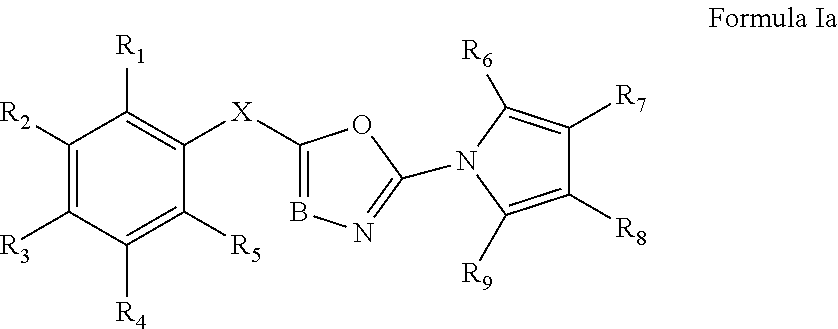Compositions and methods for controlling nematodes
- Summary
- Abstract
- Description
- Claims
- Application Information
AI Technical Summary
Benefits of technology
Problems solved by technology
Method used
Image
Examples
example 1
[0647]M. incognita testing of several nematicidal compounds in a miniaturized greenhouse assay.
[0648]Overview:
[0649]The test compound is dissolved in an acetone solution and added to water. A sprouted cucumber seedling is placed into a vial with dry sand and the water-chemical solution is added immediately. Twenty four hours later Meloidogyne incognita eggs are added to the vials and 10 to 12 days later the roots are evaluated for nematode galling.
[0650]Procedure:
[0651]Cucumber seeds are sprouted for 3 days in moist paper towels. Acceptable sprouts should be 3 to 4 cm long with several lateral roots just emerging. Stock solutions of chemistry are prepared in a mixture of acetone and Triton X100 (412 mg in 500 mL) to a final concentration of 5 mg / mL. The chemical stock solution is then added to 10 mL deionized water plus 0.015% Triton X100 and mixed thoroughly. This is enough to test each condition in triplicate. Ten mL dry sand is added to each vial. At this time the solubility of t...
example 2
General Greenhouse Testing Protocols
[0654]Soybean Planting and Growth:
[0655]Soybeans seeds are planted in 100% sand in two inch square plastic pots. Chemical treatment is done when the soybeans show the first trifoliate beginning to emerge about 10 to 12 days after planting. At least four hours after chemical application the nematode soybean cyst nematode (SCN) eggs are applied and 28 days after the egg inoculation the test is harvested.
[0656]Cucumber Planting and Growth
[0657]Cucumber seeds are planted in a sandy soil mixture in two inch square plastic pots. When the cotyledons are fully opened and just as the first leaf begins to emerge, usually 7 days after planting, chemistry for the 7-day treatment is applied. One week later the chemistry for the 0 day treatment is applied. Separate plants are used for each application. The plants are generally in the 1-2 leaf stage now. At least four hours after the chemistry application the pots are inoculated with root knot nematode (RKN) egg...
example 3
Belonalaimus longicaudatus (Sting Nematode) Testing Protocols
[0664]Populations of sting (Belonolaimus longicaudatus) nematodes are maintained on St. Augustine turf grass on soil in 15-cm pots. At test initiation the turf is removed from the pots and the soil containing nematode eggs, juveniles, and adults is subdivided into pots each containing a volume of 125 cm3. The compounds to be tested are dissolved in 3 ml of acetone using 3, 6, or 15 mg to achieve equivalent surface area application rates of 2, 4, or 10 kg / ha, respectively. The 3 ml acetone stock solution is added to 30 ml of water, and 5 ml of that solution is used to drench each of 6 replicate test pots prepared as described above. The treated pots containing nematodes are incubated in the laboratory at ambient temperature of approximately 25° C. After 3 days the soil from each pot is washed onto a modified Baermann apparatus comprised of a screen supporting a layer of filter paper on which the soil sample is placed and se...
PUM
| Property | Measurement | Unit |
|---|---|---|
| Composition | aaaaa | aaaaa |
Abstract
Description
Claims
Application Information
 Login to View More
Login to View More - R&D
- Intellectual Property
- Life Sciences
- Materials
- Tech Scout
- Unparalleled Data Quality
- Higher Quality Content
- 60% Fewer Hallucinations
Browse by: Latest US Patents, China's latest patents, Technical Efficacy Thesaurus, Application Domain, Technology Topic, Popular Technical Reports.
© 2025 PatSnap. All rights reserved.Legal|Privacy policy|Modern Slavery Act Transparency Statement|Sitemap|About US| Contact US: help@patsnap.com



